Spinal Astrocytoma — Radiotherapy: treatment in the Best Hospitals of Germany
Treatment prices are regulated by national law of the corresponding countries, but can also include additional hospital coefficients. In order to receive the individual cost calculation, please send us the request and medical records.
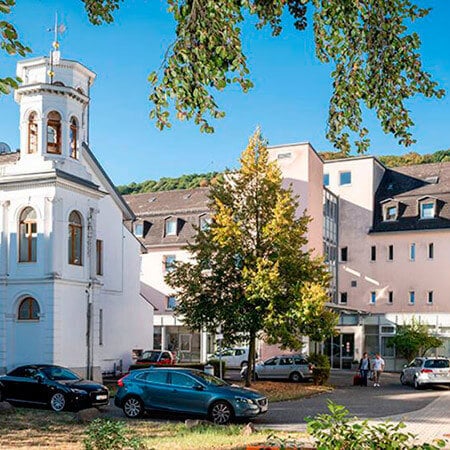
Department of Radiation Therapy and Radiation Oncology
The Department of Radiation Therapy and Radiation Oncology offers all types of modern radiation therapy for the highly effective treatment of benign and malignant tumors. The department is equipped with three linear accelerators and brachytherapy systems, which provide patients with the safest, most effective, and most sparing irradiation of tissues affected by oncopathology. The department also provides radiotherapy planning and radiosurgery. An ultramodern technical base, exceptional professionalism, and experience of the department's physicians are the cornerstones of successful clinical practice.
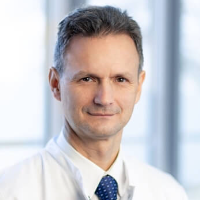


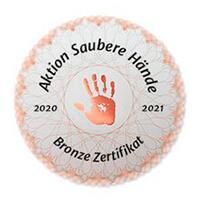

Department of Radiation Therapy
According to the Focus magazine, the University Hospital of Ludwig Maximilian University of Munich is regularly ranked among the best medical institutions in Germany! The hospital is the largest multidisciplinary medical facility, as well as a leading research and training center in Germany and Europe. The hospital is proud of its bicentenary history and tirelessly confirms its primacy at the national and international levels. The outstanding quality of medical care is complemented by highly productive research activities, thanks to which many effective diagnostic and therapeutic methods, saving people’s lives, have been presented in medical practice.
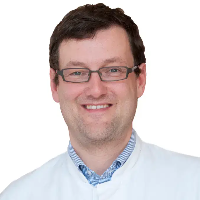






Department of Radiation Therapy
According to the Focus magazine, the Department of Radiation Therapy ranks among the top German medical facilities in the area of its specialization! The department offers all types of modern radiation therapy for cancer treatment at the highest level of university medicine. The priorities of the department's work include the treatment of tumors of the gastrointestinal tract, urogenital system in men, gynecological tumors in women, oncopathologies of the nervous system, as well as head and neck tumors. Each department's specialist strives to ensure all the patients with the most effective and at the same time customized treatment. Due attention is also paid to radiation protection.
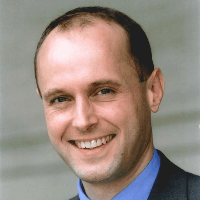




A spinal astrocytoma is a rare tumor of the central nervous system. It can have a low or high grade. It is the histological type of the neoplasm that most affects the prognosis of the disease. Benign tumors can usually be completely removed, but malignant tumors can only be partially removed, followed by radiation therapy to extend disease-free survival. You can undergo your radiation therapy at one of the German hospitals. This country offers top-class medicine and uses state-of-the-art equipment, which allows doctors to conduct radiation therapy more accurately and safely. You are welcome to use the Booking Health website to find out prices at hospitals in Germany and other countries with developed medicine.
Content
- What is a spinal astrocytoma?
- Who may need radiation therapy for spinal astrocytomas?
- Postoperative radiation therapy for spinal astrocytomas
- What irradiation methods can be used for spinal astrocytomas at German hospitals?
- Why is it best to undergo your treatment for spinal cord astrocytomas at German hospitals?
Radiation therapy is a painless procedure that causes no subjective discomfort. Preparation takes most of the time as a patient is fixed with masks and a vacuum mattress, and sometimes CT or MRI scans may be required as well. The irradiation itself takes only a few minutes.
You can seek medical attention from the MediClin Robert Janker Clinic, the University Hospital of Ludwig Maximilian University of Munich, or the University Hospital Frankfurt am Main.
Our company's employees will take care of organizing your radiotherapy abroad. We will contact the hospital's administration and make an appointment on your preferred dates. We will also book hotel and airline tickets, meet you at the German airport, and take you to the hospital by car.
What is a spinal astrocytoma?
An astrocytoma is a subtype of gliomas that may affect the brain and spinal cord. This tumor is very rare.
In general, spinal cord tumors are not among the most common oncological diseases. They account for up to 6% of all neoplasms affecting the central nervous system. In turn, only 20% of spinal cord tumors are intramedullary, that is, they are formed from the gray matter of the spinal cord. Up to 80% of them are gliomas. Even in this group of tumors, astrocytomas are not the most common type. They rank second after ependymomas. Astrocytomas account for about 30% of the total number of gliomas.
Due to the rarity of the disease, standard treatment approaches have not yet been developed. They may, therefore, vary from hospital to hospital.
Three out of four spinal astrocytomas have grades 1 or 2. They are characterized by a favorable prognosis. If you choose to undergo your treatment in a country offering top-class medicine, you can count on a complete cure for the disease. Up to 25% of cases are grade 3 and 4 astrocytomas. They have a poor prognosis. These tumors can rarely be completely removed. Treatment involves the use of combination therapy. The majority of patients experience neoplasm recurrence after treatment. This may happen at different times, depending on the quality of the treatment provided.
Who may need radiation therapy for spinal astrocytomas?
In modern medicine, radiation therapy is one of the main methods for treating cancer. It is used for most malignant tumors, and spinal cord neoplasms are no exception.
Doctors at German hospitals use radiation therapy for astrocytomas in the following cases:
- after surgical removal of a malignant tumor, regardless of the extent of resection;
- after surgical removal of a benign astrocytoma, if a doctor fails to remove it completely (perform a total resection);
- as the main treatment method, if surgery is contraindicated;
- for astrocytoma recurrence, if it is impossible to perform a revision surgical procedure.
Radiation therapy is usually an adjunct rather than the primary treatment for astrocytomas. The effectiveness of the method without surgery is quite low.
Postoperative radiation therapy for spinal astrocytomas
A surgical procedure is considered the best initial treatment for any astrocytoma. Tumor resection can be total or partial.
Doctors at German hospitals strive to remove the neoplasm completely. This provides a higher chance of curing the disease. However, the higher the grade of the astrocytoma, the more difficult it is to remove it without leaving a residual tumor. More aggressive neoplasms have an infiltrative type of growth. They penetrate deep into healthy tissue and do not have clear boundaries with it.
A grade 4 tumor is always only partially removed. For patients with grade 3 astrocytomas, total resection can be performed in only 12% of cases. Furthermore, every third patient has a neurological deficit that does not improve but worsens after surgery. When the tumor does not have any clear boundaries, doctors have to remove a significant part of the healthy tissue of the spinal cord to perform a total resection.
At the same time, the complete removal of a benign tumor is a very real task. The likelihood of a total resection depends on the surgeon's skills and experience, as well as the equipment used. In countries with poor medicine, total resection can be performed in only 5% of cases, but doctors at the best German hospitals manage to perform total tumor resection in 72% of cases of grade 1-2 astrocytomas.
Once completely removed, benign astrocytomas rarely recur, and radiation therapy is usually not required. However, postoperative irradiation is always carried out for high-grade neoplasms, as well as in the case of a residual tumor after surgery to resect grade 1-2 astrocytomas. An MRI scan is used to determine whether there is residual tumor tissue. The residual tumor, if any, will then be subject to destruction with radiation therapy.
Possible goals of postoperative therapy may include the following:
- destruction of residual tumor tissue;
- recurrence prevention;
- extension of the disease-free period;
- cure for a disease;
- increase in life expectancy.
The results of postoperative radiation therapy are better in patients with benign tumors than in those with malignant ones. As a rule, the tumor tissue remaining after irradiation decreases in size within a few weeks or months, stabilizes, and no longer progresses. Malignant astrocytomas may recur after radiation therapy, but this method still plays an important role in the treatment of the disease because it allows doctors to extend the disease-free period and give a patient a few more years of active life.
What irradiation methods can be used for spinal astrocytomas at German hospitals?
At German hospitals, as well as hospitals in other countries with highly developed medicine, modern radiation therapy options are used that are characterized by minimal exposure of healthy tissues of the spinal cord. German doctors perform intensity-modulated radiation therapy, image-guided radiation therapy, and stereotactic radiation therapy. These methods help not only to reduce the risk of side effects but also to complete the course of irradiation faster, which is very convenient for patients.
Some university hospitals in Germany use proton therapy. It is considered the safest option for spinal cord irradiation. Protons, unlike the commonly used photons, differ in that they release most of the energy only when they reach the target. On the way to the target, healthy tissues are almost never irradiated. Beyond the target, they are not irradiated at all.
The use of proton therapy increases the cost of treatment but reduces the risk of complications. Proton therapy is considered the best method of radiation therapy for children, as astrocytomas are also common in childhood. These tumors have a low grade and a favorable prognosis in children. Since a child who is being treated at a German hospital can recover completely from the disease, it is important to preserve the functions of their spinal cord as much as possible and reduce the risk of developing secondary tumors. These goals can be achieved with proton therapy.
Why is it best to undergo your treatment for spinal cord astrocytomas at German hospitals?
Hospitals in countries with advanced medicine have state-of-the-art equipment. Doctors abroad use advanced radiation therapy techniques that allow them to destroy the tumor faster, more reliably, and safely.
In countries with highly developed medicine, attention is paid not only to a person's life expectancy after the completion of treatment but also to the quality of life. Doctors strive to cure astrocytomas while preserving the functions of the spinal cord as much as possible.
There are a few reasons for you to undergo your treatment in Germany. These are the following:
- innovations in medicine are applied here;
- doctors use more accurate and safer radiation therapy techniques;
- radiation therapy can be completed faster, in fewer sessions;
- a lower risk of developing or worsening neurological deficits;
- some hospitals use proton therapy, which is the safest irradiation method, especially for children.
You can make your appointment for radiation therapy at one of the German hospitals through the Booking Health service. On our website, you can find out prices for all procedures and operations. They can be compared at different hospitals to choose the best option. When you make your treatment appointment through Booking Health, prices will be lower than when contacting the hospital directly, due to the absence of taxes for foreign patients.
Authors:
The article was edited by medical experts, board-certified doctors Dr. Nadezhda Ivanisova and Dr. Vadim Zhiliuk. For the treatment of the conditions referred to in the article, you must consult a doctor; the information in the article is not intended for self-medication!
Sources:

